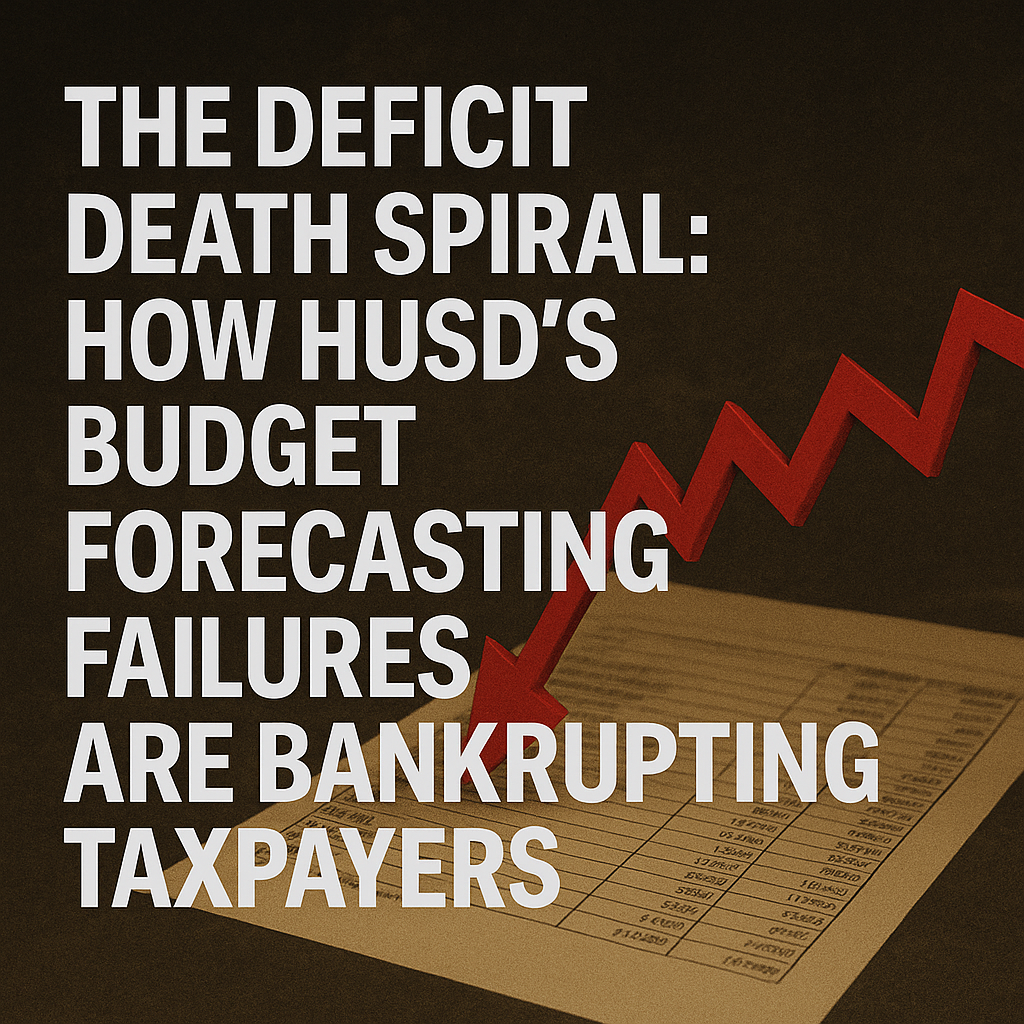The Deficit Death Spiral: How HUSD’s Budget Forecasting Failures Are Bankrupting Taxpayers

District admits to continued deficit spending while using temporary funds for permanent positions
By Tom Wong, Independent Investigative Reporter
July 7, 2025
The most damning evidence of Hayward Unified School District’s financial incompetence isn’t hidden in complex spreadsheets or buried in footnotes. It’s right there in plain English in the district’s own budget documents: “we are continuing to deficit spend” while funding permanent positions with temporary revenue that’s “due to expire this upcoming year.”
This isn’t a temporary cash flow problem or an unexpected emergency. This is systematic fiscal malpractice that has become HUSD’s standard operating procedure, enabled by administrators who treat taxpayer money like an endless credit line and board members who rubber-stamp spending without demanding accountability.
The Admission of Failure
During the June 25, 2025 budget adoption meeting, HUSD administrators made a stunning confession buried in bureaucratic language. They acknowledged the district faces “the need for the Board to take action to implement ongoing budget solutions” because they’re funding positions with one-time revenues while continuing deficit spending.
Translation: We’ve been spending money we don’t have to pay for jobs we can’t afford, and now the bill is coming due.
This admission represents a complete failure of the most basic responsibility of public administration: living within your means. While Superintendent Chien Wu-Fernandez collects her estimated $371,250 annual compensation package, she’s overseen a budgeting process so incompetent that the district can’t distinguish between temporary and permanent funding sources.
The Kick-the-Can Strategy
HUSD’s response to this crisis reveals the depth of administrative incompetence. Rather than immediate corrective action, they’ve adopted a kick-the-can strategy:
- September 2025: Return with “recommended amounts needed for budget solutions”
- February 2026: Present “recommendations for spending reductions”
This timeline means HUSD will continue deficit spending for at least eight more months while promising vague “solutions” that never materialize. It’s like promising to start your diet next Monday while continuing to eat donuts for breakfast.
The Numbers Don’t Lie
HUSD’s May 2025 expenditures totaled $37,368,365.52, suggesting an annual spending rate approaching $450 million for roughly 17,300 students. That’s approximately $26,000 per student before factoring in additional revenue sources — more than many private schools charge for tuition.
Yet despite this massive per-student spending, HUSD can’t balance its books. The district’s financial reports show:
Revenue vs. Expenditure Patterns:
- Consistent spending above sustainable revenue levels
- Dependency on one-time federal COVID relief funds
- Use of temporary grants to fund permanent administrative positions
- Depletion of reserve funds to cover operational shortfalls
The One-Time Revenue Shell Game
The core of HUSD’s budget crisis lies in a dangerous practice: using temporary revenue sources to fund ongoing operational expenses. This financial shell game includes:
Temporary Funding Sources Used for Permanent Costs:
- Federal COVID relief funds (ESSER I, II, III)
- One-time state categorical grants
- Special program allocations with sunset clauses
- Emergency funding not intended for ongoing operations
When these revenue streams expire — as they inevitably must — HUSD faces a stark choice: eliminate the positions or find permanent funding. Given their track record, administrators will likely demand tax increases rather than right-sizing operations.
The Forecasting Failure Pattern
HUSD’s budget forecasting has been consistently wrong, revealing either incompetence or deliberate deception:
Historical Forecasting Errors:
- Overestimating sustainable revenue growth
- Underestimating the temporary nature of federal funds
- Failing to account for pension and benefit cost increases
- Ignoring the impact of declining enrollment on per-pupil funding
These aren’t minor miscalculations — they’re fundamental failures to understand basic budget dynamics that any competent CFO should master.
The Administrative Bloat Factor
While claiming budget constraints, HUSD continues expanding administrative positions that drain resources from classrooms:
Recent Administrative Expansions:
- New Assistant Superintendent of Student and Family Services (contract through June 2027)
- Multiple director-level positions in recent years
- Expanded consultant dependencies for basic functions
- Growing support staff for administrative operations
Each new administrative position represents $200,000+ in annual costs when including benefits, yet HUSD claims it can’t afford basic classroom supplies or competitive teacher salaries.
The Contractor Dependency Crisis
HUSD’s deficit spending is exacerbated by systematic outsourcing of functions that other districts handle internally:
Annual Contractor Costs:
- Special education services: $9+ million
- Facilities maintenance: $500,000+
- Professional services: $300,000+
- Technology support: $200,000+
These contracts represent HUSD’s admission that internal staff lack basic competencies. While other districts successfully provide these services with existing personnel, HUSD requires an army of expensive contractors.
Comparative District Analysis
Nearby school districts with similar demographics manage to balance budgets without HUSD’s dysfunction:
Dublin Unified School District:
- Maintains balanced budgets consistently
- Lower administrative overhead per student
- Sustainable fiscal practices without deficit spending
- Transparent budget forecasting with accurate projections
San Lorenzo Unified School District:
- Balanced operational budgets
- Appropriate reserve fund levels
- Accountable spending practices
- Realistic revenue projections
The difference isn’t student needs or state funding — it’s management competence and fiscal discipline.
The Reserve Fund Depletion
HUSD has systematically depleted reserve funds meant for emergencies to cover operational shortfalls. This practice:
- Eliminates financial cushion for actual emergencies
- Violates best practices for public agency financial management
- Indicates structural budget imbalances
- Creates vulnerability to economic downturns
The Real Cost to Taxpayers
HUSD’s deficit spending and forecasting failures translate into real costs for families:
Annual Household Impact:
- Property tax increases to cover operational deficits
- Special assessments and parcel taxes
- Long-term bond debt service obligations
- Opportunity costs of misallocated resources
Every dollar wasted on deficit spending is a dollar that could have been invested in classroom instruction, student support services, or genuine facility improvements.
The Accountability Vacuum
HUSD’s board meetings treat deficit spending as routine business, with no demands for explanations or consequences:
Board Response to Budget Crisis:
- Rubber-stamp approval of deficit budgets
- No questions about forecasting accuracy
- Acceptance of administrator promises without verification
- Failure to demand immediate corrective action
Board President Peter Bufete and his colleagues have abdicated their fiduciary responsibility to taxpayers by enabling this fiscal malpractice.
What Other Districts Do Right
Successful school districts follow basic budget principles that HUSD ignores:
Best Practices HUSD Rejects:
- Conservative revenue forecasting with built-in contingencies
- Strict separation of one-time and ongoing funding sources
- Regular budget monitoring with course corrections
- Transparent reporting of fiscal challenges
- Immediate action when deficits emerge
The September Reckoning
When HUSD returns in September with their latest “budget solutions,” taxpayers should expect:
- Demands for tax increases rather than spending cuts
- Blame directed at state funding rather than internal mismanagement
- Promises of future reforms without immediate action
- Protection of administrative positions while cutting student services
What Taxpayers Must Demand
Before approving any budget “solutions,” taxpayers should require:
- Complete historical analysis of forecasting errors and their causes
- Immediate hiring freeze on all non-essential administrative positions
- Independent audit of all revenue sources and their sustainability
- Binding commitment to eliminate deficit spending within 12 months
- Monthly public reporting of budget performance vs. projections
- Personal accountability for administrators who created this crisis
The Bottom Line
HUSD’s deficit spending and forecasting failures represent the most fundamental breakdown of public administration: the inability to live within one’s means while providing basic services.
Superintendent Wu-Fernandez and her administrative team have created a fiscal disaster that will burden taxpayers for years while delivering declining services to students. Their promises of future “solutions” ring hollow when they can’t even acknowledge the scope of their failures.
The September budget meeting will test whether HUSD’s board has any remaining credibility as stewards of public resources. Based on their track record of enabling fiscal irresponsibility, taxpayers shouldn’t expect meaningful reform without sustained public pressure.
Until HUSD replaces failed leadership with competent administrators who understand basic budget principles, the deficit death spiral will continue. The question isn’t whether this fiscal house of cards will collapse — it’s whether taxpayers will demand accountability before the damage becomes irreversible.
Hayward families deserve better than this systematic fiscal malpractice disguised as public service. They deserve honest budgeting, transparent reporting, and leadership that prioritizes fiscal responsibility over administrative empire-building.
The deficit spending crisis at HUSD isn’t a technical problem requiring consultant studies — it’s a leadership failure requiring immediate corrective action. Every month of delay makes the eventual reckoning more painful for taxpayers and more damaging to students.













